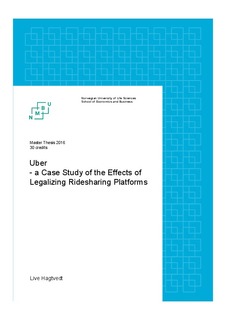| dc.contributor.advisor | Romstad, Eirik | |
| dc.contributor.author | Hagtvedt, Live | |
| dc.date.accessioned | 2016-08-26T09:57:48Z | |
| dc.date.available | 2016-08-26T09:57:48Z | |
| dc.date.issued | 2016-08-26 | |
| dc.identifier.uri | http://hdl.handle.net/11250/2402001 | |
| dc.description.abstract | This thesis investigates the ridesharing platform Uber, and the consequences following potential legalization of Uber in the Norwegian market. Through existing research and a quantitative survey on consumer preferences, I seek to find whether adjustments of existing laws and regulations in the transport sector can contribute to desired innovative introductions in the taxi market and increase societal welfare in Norway.
Generally, sharing economy firms are described as platforms facilitating and coordinating transactions between individuals. These developments have become possible through technological change and innovation, in particular on the way information is spread and processed. In turn, this has opened and will continue to expand the scope for supplying new services. However, many of these services, including Uber, face challenges when encountering national legislation. The expansion of ridesharing services has caused debates on the appropriateness of the current structure of the Norwegian taxi industry, and whether legislative changes are in order.
The framework of this study consists of an in-depth study of Uber, a quantitative survey and a theoretical evaluation of the existing market and relevant regulations.
This study concludes that Uber’s entry brings welfare benefits to consumers, through lower prices and increased consumer surplus. In addition to generating incentives for the regular taxi industry to improve, the characteristics of Uber’s business model have shown increased efficiency, quality and safety in the taxi industry. Moreover, benefits are expected to reach beyond the taxi market. Based on the conclusion, the thesis suggests a modification of existing regulations, abolishing the current means tested supply and regulations on price. | nb_NO |
| dc.description.abstract | Denne oppgaven omhandler bildelingstjenesten Uber, og undersøker hvilke konsekvenser lovliggjøring av Uber i det norske markedet vil ha. Gjennom eksisterende forskning, i tillegg til en kvantitativ spørreundersøkelse om forbrukerpreferanser, prøver jeg å gi svar på hvorvidt forandring av eksisterende regler i transportsektoren kan føre til ønskede og innovative tilskudd i taximarkedet, og øke velferd i Norge.
Generelt blir delingsøkonomiselskaper beskrevet som plattformer som forenkler og koordinerer transaksjoner mellom aktører. Slike utviklinger er gjort mulig av teknologiske forbedringer og innovasjon, særlig i forhold til informasjonsdeling og -behandling. Videre har utviklingen åpnet for nye muligheter for hvordan tjenester tilbys. Til tross for dette møter mange delingstjenester, inkludert Uber, utfordringer i møte med nasjonale lover og regler. Økningen av antall bildelingstjenester har medført store debatter om egnetheten til nåværende strukturen av norsk taxiindustri, og hvorvidt tiden er inne for et nytt sett med lover og regler.
Oppgaven består av en detaljert og grundig studie av Uber, en kvantitativ spørreundersøkelse og en teoretisk vurdering av det eksisterende markedet med tilhørende reguleringer.
Det konkluderes med at Ubers inntreden gir en velferdsøkning for konsumenter gjennom lavere priser og økt konsumentoverskudd. I tillegg til å generere forbedringsinsentiver for den tradisjonelle taxiindustrien, har Ubers forretningsmodell medført økt effektivitet, kvalitet og sikkerhet i taxiindustrien. Videre forventes det at Uber vil påvirke samfunnet utover taximarkedet. Basert på konklusjonen presenteres lovforslagsendringer som inkluderer en avvikling av behovsprøvingen og prisreguleringer. | nb_NO |
| dc.language.iso | eng | nb_NO |
| dc.publisher | Norwegian University of Life Sciences, Ås | |
| dc.subject | Ridesharing | nb_NO |
| dc.subject | Uber | nb_NO |
| dc.subject | Sharing Economy | nb_NO |
| dc.title | Uber : a case study of the effects of legalizing ridesharing platforms | nb_NO |
| dc.type | Master thesis | nb_NO |
| dc.subject.nsi | VDP::Social science: 200::Economics: 210::Economics: 212 | nb_NO |
| dc.source.pagenumber | 93 | nb_NO |
| dc.description.localcode | M-ECON | nb_NO |
